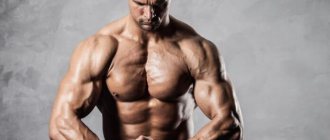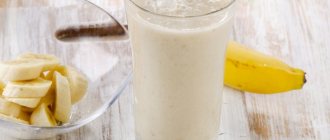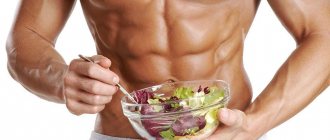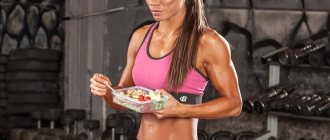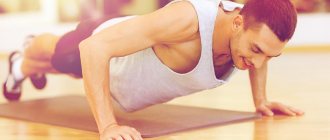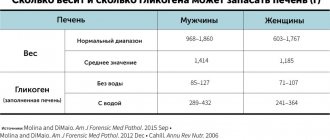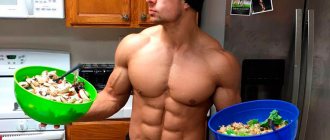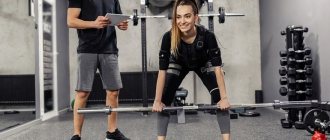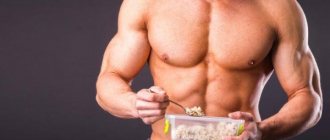It takes a lot of time to gain muscle mass. And a lot of money is spent on quality food. But not everyone has the means to properly plan their meals for high-quality weight gain, so many people start eating the wrong foods, because of which you will not only not be able to progress normally, but will also ruin your health.
If you want to gain muscle mass without spending a lot of money, then you have come to the right place. Now I will tell you about budget and healthy products that will allow you to gain good muscle mass.
BJU on weight and fat burning
There is an opinion that to burn fat you need to create a calorie deficit, and to gain weight you need to increase the number of calories. How, from these two seemingly different programs, can you achieve two goals - burning fat and gaining muscle mass?
First of all, the diet must be correctly composed according to the ratio of proteins, fats and carbohydrates. Protein is the main building material for muscles, and carbohydrates provide the necessary energy reserves. Per 1 kg of body weight, the minimum threshold for protein intake is 1 g. This will be enough to maintain muscle mass, but not gain. From 1.5 to 5 g of protein per kilogram of body weight is necessary for muscle growth (depending on diet, training, hormonal “feeding”, etc.). The average is approximately 2-2.5 g of protein per kg of body weight.
Fats are also necessary for the normal functioning of the body, to maintain good condition of skin, hair and nails. But there are different types of fats; their basis should be polyunsaturated fats. They should be consumed primarily from fatty varieties of sea fish. As for the optimal amount of fat per day, the threshold varies from 0.7 to 1 g per 1 kg of weight. About 60% of fats should be obtained from plant foods and 40% from animal foods.
The main sources of polyunsaturated fats:
- linseed oil;
- olive oil;
- fish fat.
Carbohydrates are also divided into simple and complex. The diet should consist of complex carbohydrates, they serve as energy for training, and they also contribute to the proper functioning of the gastrointestinal tract. The selection of the amount of carbohydrates should be calculated individually depending on weight, age, training program and other parameters.
How to gain lean muscle mass without fat?
We are all accustomed to the principle - “I eat everything I see” is a logical solution when gaining weight, because the more you eat, the more you grow, right?
Not really.
If you don't eat enough food, you won't be able to grow, but there is a clear difference between simply gaining body weight and gaining lean muscle without fat. We are talking about gaining muscle without fat, what diet will help you achieve the desired results.
Guys who, in their desire to gain as much muscle as possible, justify eating too much junk food with a lot of fat in order to gain weight in the hope of stimulating additional muscle growth are sorely mistaken.
This option does not suit us.
Your body has a limited ability to gain mass. Unfortunately, it has no restrictions on weight gain in the form of adipose tissue (then we would be much more attractive).
Each person has a different ability to grow muscle tissue. This depends on how much protein your body can synthesize, which in turn depends on your testosterone levels, testosterone levels depend on your stress levels, your insulin sensitivity, the genetic makeup of your muscle fibers, and many other variables.
“-50” technique
An interesting technique is the “-50” program. It consists of reducing the amount of carbohydrates by 50 g per week.
The first week of the program starts, for example, with 350 g of carbohydrates per day, after a week, we reduce this amount by 50 g, beans and fats remain at the same level. You won’t notice any loss of energy when you reduce carbohydrates by 50 g; your body will quickly adapt to receiving less of them.
After another week, we further reduce the amount of carbohydrates by 50 g.
Starting in the third week, when you remove another 50 grams of carbohydrates from your diet, you may experience a lack of energy. At this point it is worth adding some protein, this could be a protein shake that will help improve performance. A decrease in performance occurs when carbohydrates in your daily diet become about 150 g.
A gradual reduction in carbohydrates will help with fat burning, and protein will maintain performance levels. It is in this case that the protein norm per kilogram of body weight begins to increase.
Note! There is no need to reduce the amount of carbohydrates much below 150 g per day.
With such a diet, there will still come a time when the body begins to absorb amino acids from muscle fibers, thereby leading to a catabolic effect, that is, muscle loss. If you do not want to increase the total amount of protein in your diet to avoid this, you can buy BCAA and start taking this complex from the very beginning of the diet.
The amino acid leucine present in the complex will act as an anti-catabolic. Leucine, of course, will not reduce cortisol levels, but will act as an excellent energy agent. Thus, you will be able to maintain anabolism at the proper level and be able to increase working weights during training.
A BCAA dosage of about 15-20 g per day will be sufficient. It is best to drink BCAAs in small doses throughout your workout. If the lack of protein is significant, but for some reason you still do not want to increase the total amount of protein in your diet, then it would be very advisable to take BCAA not only during training, but a couple of times during the day.
The use of oatmeal in medicine
In nutrition for many diseases, it is coarse oat grains that are used: crushed or flattened. They retain all the beneficial substances, fiber, and also have a lower glycemic index. Therefore, whole oat grains can be eaten if you have diabetes. Quick-cooking oatmeal will not bring any benefits - they contain a lot of sugar, the glycemic index is much higher, and almost no useful substance is retained.
Medicinal jelly and liquid porridges made with water are made from oats. They envelop the mucous membrane of the stomach and intestines and stimulate digestion. It is useful for ulcers, gastritis, constipation. Oatmeal slows down the disease and prevents it from getting worse. It was used to feed the sick decades ago.
The risk of intestinal cancer, which is much higher with stagnation of feces, that is, constipation, is also reduced. Regular bowel movements, which oatmeal promotes, reduces the risk of cancer.
General recommendations
If, while on a diet, you feel a feeling of hunger that you cannot control, then here are some foods that can help you cope with hunger without harming the weight loss process. These include:
- cucumbers;
- cabbage;
- green beans;
- tomatoes;
- Green pepper;
- zucchini
These products have virtually no calories and will not harm the weight loss process.
As a rule, the feeling of hunger may haunt you for the first 2-3 weeks after reducing the amount of carbohydrates. After this time, the body will readjust, get used to this type of nutrition and the feeling of hunger will disappear.
Note! Aerobic exercise should be included in your workouts; it will help you more actively turn on the fat burning process.
We leave proteins and fats unchanged, manipulate only carbohydrates, reducing them by 50 g per week and evaluate the results.
We also monitor strength results. When they start to fall, stop reducing carbohydrates, or even for 3-4 weeks you can slightly increase 40-50 grams. After getting used to this diet, you can continue to reduce carbohydrates by 20-30 g per week, reaching 100-120 g of carbohydrates per day. There is no point in crossing this threshold.
Having achieved the desired result, remember that you should maintain the resulting forms, since it is very easy to regain lost fat. Burning fat and maintaining muscle mass is possible!
Example of a 3,000 kcal diet - Table
| Dry mass gain without fat | |
| Eating | 3000 kcal |
| № 1 – 7:00 | 2 tbsp. cooked oatmeal, protein shake, fish oil 462 kcal, Proteins/Carbohydrates/Fats = 34.9/59.1/9.6 |
| № 2 – 10:00 | Medium banana, 4 boiled eggs 415 kcal, used/U/F = 26.3/28.6/21.5 |
| № 3 – 13:00 | 2 medium potatoes, 115 g chicken breast 405 kcal, used/U/F = 32.9/66.4/6.2 |
| № 4 — 15:30 | Protein shake, 30 g almonds, 6 strawberries, 12 grapes 348 kcal, used/U/F = 29.9/24.6/16 |
| Training – 17:00 | — |
| № 5 – 19:00 | 170 g ground beef (80% lean), 2 tbsp. boiled rice, 115 g salsa, 230 g vegetables of your choice 985 kcal, used/U/F = 57.7/114.7/30.9 |
| № 6 — 21:30 | Casein shake, fish oil, 2 rice cakes, 1.5 tbsp. l. peanut butter 381 kcal, used/f = 28/23.7/15.1 |
| Total | 2996 kcal, used/U/F = 209.7/317.1/99.3 |
Vegetarian bodybuilding increases the risk of certain vitamin and mineral deficiencies
Vegetarian bodybuilding increases the risk of certain vitamin and mineral deficiencies. Among them are vitamin B12, iron, zinc, calcium.
We recommend : Vegetarianism/veganism and sports: benefits and RISKS
Vitamin B12
Vitamin B12 plays an important role in blood formation and cell division. The risk of vitamin B12 deficiency is especially high among strict vegetarians who eat exclusively plant foods, since this vitamin is only found in animal products . For lacto-vegetarians and lacto-ovo-vegetarians, there is virtually no risk of B12 deficiency.
If the bodybuilding-vegetarian combination also includes alcohol and tobacco , this significantly increases the risk of vitamin B12 deficiency, since all these nasty things interfere with its absorption.
All vegetarian/vegan bodybuilders are recommended to supplement their diet with plant foods fortified with B12 (breakfast cereals, soy products), brewer's yeast, or take it in the form of a tablet/injection.
We recommend : Vitamin B12 deficiency: symptoms, causes and treatment
Iron
In the case of iron, zinc and calcium, there is a double problem when it comes to vegetarianism and bodybuilding. On the one hand, these minerals are present in small quantities in plant foods; on the other hand, many plants contain plant substances (phytates, isoflavones, oxalates) that interfere with the absorption of minerals in the intestines.
Iron in bodybuilding is responsible for the transport of oxygen to the muscles and it is involved in the transmission of nerve impulses, including excitation impulses that precede muscle contraction. It is clear that iron deficiency leads to impaired muscle performance.
Iron is found in large quantities in red meat. There is little of it in plant foods. Moreover, there are two forms of iron: one is characteristic of plants, the other is characteristic of meat. Vegetable is absorbed much worse .
Those. in the case of vegetarianism in bodybuilding, we get a double problem: not only is there less iron in the diet quantitatively, but it is also very poorly absorbed.
Vegetarian bodybuilders are recommended to eat foods fortified with it, as well as green leafy vegetables and legumes, or, as a last resort, nutritional supplements.
We recommend : 10 symptoms of iron deficiency
Zinc
Zinc is another micronutrient for which the risk of deficiency is increased in strict vegetarians , who eat no animal products at all.
Dairy products and eggs contain it in sufficient quantities.
Research suggests that bodybuilding and sports activities increase the excretion of zinc from the body (1).
Good natural sources of zinc include oysters, crab, shrimp, wheat germ, legumes, nuts, and whole grains. Refined grains (porridge, flour) contain it in very small quantities, since it is removed with the shell.
Calcium
Calcium in bodybuilding ensures primarily bone health.
It is present in large quantities in dairy products.
Its absorption is significantly hampered by plant phytates, oxalates, and fiber . A lack of vitamin D is also known to reduce the absorption of calcium.
Good natural sources of calcium include dark leafy green vegetables (spinach, broccoli), low-fat milk, Romanesque cheese, Swiss cheese, sardines and canned salmon.
You can also use dietary mineral supplements to replenish it.
Strict vegetarianism in bodybuilding increases the risk of deficiency of certain vitamins and minerals: especially vitamin B12, iron, zinc, calcium
We recommend : Which vitamins are better to take: synthetic or natural from products?
The use of oatmeal in cooking
Oatmeal is loved by many, although it is usually prepared simply: boiled with milk. But there are many interesting recipes for oatmeal, some of them are even simpler and healthier than the usual cooking.
Oatmeal with kefir and honey
A healthy breakfast that allows you to not bother with cooking porridge, but just mix the ingredients. This method allows you to preserve the maximum of useful substances, as well as reduce the amount of phytic acid, which is controversial in its effect on the body. Instead of kefir, you can use fermented baked milk, yogurt, and yogurt. Add your favorite nuts or seeds
Photo: pixabay.com
| Oatmeal "Hercules" | 150 g |
| Kefir | 300 ml |
| Honey | taste |
| Orange (or apple) | 1 PC. |
Pour kefir over long-cooked oatmeal - you may need a little more or less. Add liquid honey and stir. Peel the orange, cut into cubes and add to the oats. Divide the porridge into portioned containers, you can put an orange on top or mix everything. You can use jars, molds, bowls.
Put it in the refrigerator overnight and in the morning you can enjoy a ready-made breakfast.
Share your recipe
Send the recipe for your signature dish to the mail "Komsomolskaya Pravda" will publish the most interesting and unusual ideas
Share
Caramel oatmeal
A simple porridge with a pleasant caramel taste. Good served with sliced banana and almonds
Photo: pixabay.com
| Milk | 300 ml |
| Cereals | 30 g |
| Powdered sugar | 50 g |
| Salt, butter | taste |
Take a saucepan with a thick bottom, mix all the cereal and powdered sugar in it. Place over medium heat and stir until the sugar caramelizes. A characteristic smell of burnt sugar will appear and the flakes will become darker.
Then pour the heated milk over the oats, stir, add salt and bring to a boil. Cook over low heat for another 10-15 minutes. Add butter before serving.
show more
What foods strengthen your body muscles?
The condition and growth of muscles depends on both physical activity and proper nutrition. The growth and strengthening of muscle mass is ensured by the following items:
- peas;
- milk;
- chicken breast;
- turkey;
- oysters;
- nuts;
- oatmeal;
- cottage cheese;
- yogurt;
- avocado;
- bananas;
- spinach;
- apples;
- brown rice;
- broccoli.
Attention! Often, against the background of active training for muscle growth, dehydration is observed. Dehydration negatively affects overall well-being and muscle condition; you need to drink about 3 liters of water per day.
Sample workout for a vegetarian diet
Now you know how vegetarians eat when they want to build muscle. Remember that if your goal is to increase muscle strength and size, you need to exercise. If you don't stick to a strict training regimen, no matter what you eat, you won't make progress.
Many gym goers make the mistake of focusing primarily on isolation exercises and if their workouts are too high in volume.
If you're looking to develop strength and increase muscle size, spend more time doing compound exercises that work multiple muscle groups at once. These include deadlifts, squats, standing presses, dips, pull-ups, bent-over rows, and chest presses.
Below is a 4-day program that will help you increase muscle strength and size.
